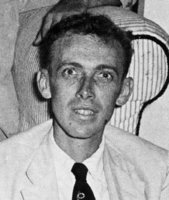James Watson

Watson, James
| Topics: |
In 1962 James Watson (1928– ), Francis Crick (1916–2004), and Maurice Wilkins(1916–2004) jointly received the Nobel Prize in medicine or physiology for their determination in 1953 of the structure of deoxyribonucleic acid (DNA).
In 1951 23-year-old Watson, a Chicago-born American, arrived at the Cavendish Laboratory in Cambridge. Watson had two degrees in zoology: a bachelor's degree from the University of Chicago and a doctorate from the University of Indiana, where he became interested in genetics. Watson went to Denmark for postdoctoral work. At a conference at the Zoological Station at Naples, Watson heard Wilkins talk on the molecular structure of DNA and saw his recent X-ray crystallographic photographs of DNA—and was hooked.
Watson soon moved to the Cavendish Laboratory. There several important X-ray crystallographic projects were in progress under William Lawrence Bragg's leadership. There, Watson met Crick and the two rapidly put together several models of DNA and attempted to incorporate all the evidence they could gather. Rosalind Franklin's excellent X-ray photographs, to which they had gained access without her permission, were critical to the correct solution.
Watson's subsequent career eventually took him to Cold Spring Harbor Laboratory of Quantitative Biology on Long Island, where as director from 1968 onward he led it to new heights as a center of research in molecular biology. From 1988 to 1992 he headed the National Center for Human Genome Research at the National Institutes of Health.
Further Reading